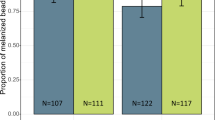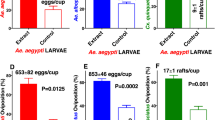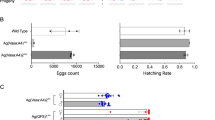Abstract
CHANGES in the house-haunting habits of Anopheles, observed during campaigns of residual spraying with DDT, may be of various kinds. Moreover, they may interfere in a complicated way with malaria transmission1. Much attention has been directed in recent years to the appearance of strains showing a hyper-irritability towards the insecticide, leading to decreased insecticide contact and increased survival2–5.
This is a preview of subscription content, access via your institution
Access options
Subscribe to this journal
Receive 51 print issues and online access
$199.00 per year
only $3.90 per issue
Buy this article
- Purchase on Springer Link
- Instant access to full article PDF
Prices may be subject to local taxes which are calculated during checkout
Similar content being viewed by others
References
Hamon, J., Bull. Wld. Hlth. Org., 29, Supp. 115 (1963).
Trapido, H., Amer. J. Trop. Med. Hyg., 1, 853 (1952).
Muirhead Thomson, R. C., Bull. Wld. Hlth. Org., 22, 721 (1960).
Mattingly, P. F., Ann. Rev. Ent., 7, 419 (1962).
Slooff, R., thesis, Leyden (1964).
Beard, R. L., Conn. Agric. Exp. Sta. Bull., 611 (1957).
Author information
Authors and Affiliations
Rights and permissions
About this article
Cite this article
GEROLD, J., LAARMAN, J. Selection of some Strains of Anopheles atroparvus with Different Behavioural Responses to Contacts with DDT. Nature 204, 500–501 (1964). https://doi.org/10.1038/204500b0
Issue Date:
DOI: https://doi.org/10.1038/204500b0
This article is cited by
-
10.1007/BF00344537
CrossRef Listing of Deleted DOIs (2011)
-
The endogenous regulation of mosquito reproductive behavior
Experientia (1990)
-
Behavioural analysis of feeding and reproduction in haematophagous insects
Proceedings: Animal Sciences (1985)
-
Behavioural Responses to Contact with DDT in Anopheles atroparvus
Nature (1967)
Comments
By submitting a comment you agree to abide by our Terms and Community Guidelines. If you find something abusive or that does not comply with our terms or guidelines please flag it as inappropriate.



